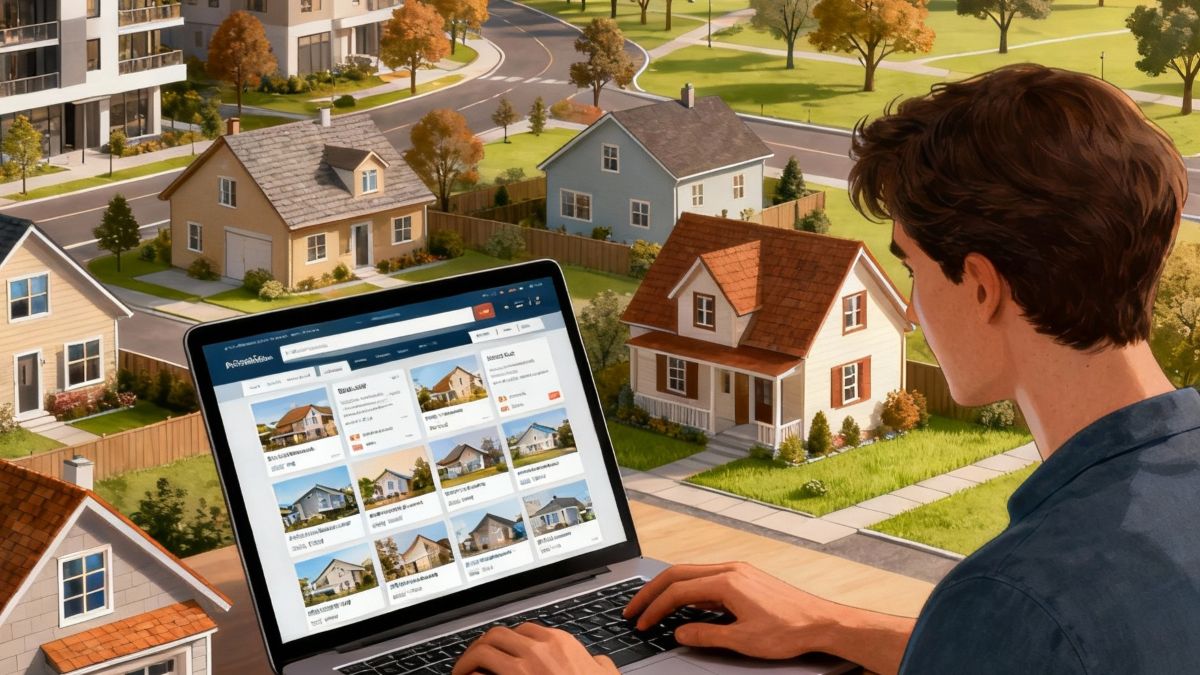Step 3: The Fun (But Often Challenging) Part — How Do You Find It?
You've identified your ideal locations and defined your requirements. Now comes the exciting part: actually finding your home. Master online search strategies, smart filters, and the tools that help you spot overlooked gems while avoiding common pitfalls.
The New Reality: You're in the Driver's Seat
The home search process has transformed dramatically. Today, 51% of buyers find their home online, compared to just 29% through a real estate agent. A staggering 96% of buyers begin their search online, with 78% starting directly on search engines or real estate websites.
This shift means you're no longer dependent on an agent to discover listings. Instead, you're the primary detective in your own home search, armed with powerful online tools and more information than any previous generation of buyers.
The Big Three: Major Online Platforms
Three platforms dominate the online home search landscape, each with distinct strengths:
🏠 Zillow (50%+ market share)
Pros: Largest listing database, user-friendly interface, Zestimate home values, robust mobile app, virtual tours
Cons: Occasional listing lag, Zestimate accuracy varies, heavy advertising
🏢 Realtor.com (29% market share)
Pros: Direct MLS access, most up-to-date listings, trusted data source
Cons: Less intuitive design, fewer advanced features
🔴 Redfin (10%+ market share)
Pros: Up-to-date listings, excellent map tools, "Hot Homes" algorithm, agent rebates
Cons: Limited coverage in smaller markets, variable service quality
Pro tip: Use multiple platforms to avoid missing hidden gems. No single portal is perfect, but together they provide comprehensive coverage.
Smart Search Strategy
Beyond basic filters like price and bedrooms, use advanced search criteria to find overlooked opportunities:
📊 Market Signals
- • Days on market (longer = potential opportunity)
- • Price reductions
- • New listings on off-days
- • Owner tenure (long-term owners = stable)
🎯 Lifestyle Filters
- • Walkability scores
- • Commute time to work
- • School district ratings
- • Crime statistics
Set up alerts on multiple platforms with your precise criteria. Monitor these signals daily—the best opportunities often appear and disappear quickly.
The Evolving Role of Real Estate Agents
While 88% of buyers still use agents, their role has fundamentally changed. Agents are no longer gatekeepers of listings—they're now transaction facilitators and negotiation experts.
Key insight: You find the homes; your agent helps you evaluate, negotiate, and close the deal. This shift puts the responsibility for being an educated consumer squarely on your shoulders.
🤝 Finding the Right Agent
- • Start with referrals: 40% of buyers find agents through personal networks
- • Interview 2-3 agents: Ask about local market knowledge, response time, and track record
- • Define the relationship: Understand services, fees, and communication expectations
- • Check their system: Do they send curated listings? Can they access off-market properties?
Your Search Process Checklist
- 1. Set up alerts on multiple platforms with precise filters (location, price, features, commute time)
- 2. Monitor opportunity signals like price adjustments, extended market time, and new listings
- 3. Track key metrics in a spreadsheet: listing date, price, days on market, comparables
- 4. Schedule showings strategically—walk the neighborhood, check nearby amenities
- 5. Get pre-approved for financing to act quickly on the right property
- 6. Interview agents before becoming emotionally invested in any property
- 7. Use the Convenience Scanner to evaluate daily life factors beyond just the house
How ConvenientHouse Helps You Find Hidden Gems
Traditional search filters miss what really matters in daily life. The Convenience Scanner fills this gap by quantifying neighborhood convenience on a 0-100 scale across four essential categories:
🛒 Grocery Access
Quality and accessibility of supermarkets and specialty stores within your daily range
💊 Pharmacy Proximity
Access to prescriptions and health essentials when you need them
🔨 Hardware Stores
DIY and repair supplies for home maintenance and projects
🏪 Warehouse Clubs
Bulk buying and big-box cost savings for household essentials
This tool reveals that "close on the map" doesn't always mean "convenient in daily life." It helps you spot overlooked gems by showing how a property's location enhances your daily routines, not just its price per square foot.
Avoiding Common Pitfalls
The digital search process demands vigilance to avoid costly mistakes:
🚩 Red Flags to Watch For
- • Outdated or misleading photos
- • Vague property descriptions
- • Unrealistic pricing (too good to be true)
- • Pressure to make quick decisions
- • Requests for money before viewing
Always verify listings through multiple sources, visit neighborhoods at different times, and never skip the inspection process. Remember: you're not just buying a house, you're buying into a lifestyle.
✅ The Bottom Line
Successful home searching today requires combining digital savvy with local knowledge and the right tools. You're the strategist, filter-setter, and decision-maker. Agents and portals support your search, but they don't replace your homework.
With your locations defined (Step 1) and requirements clarified (Step 2), you're ready to master the search process. Use multiple portals, refine your filters, interpret market signals, and leverage tools like the Convenience Scanner to find not just a house, but a home that truly fits your life.
